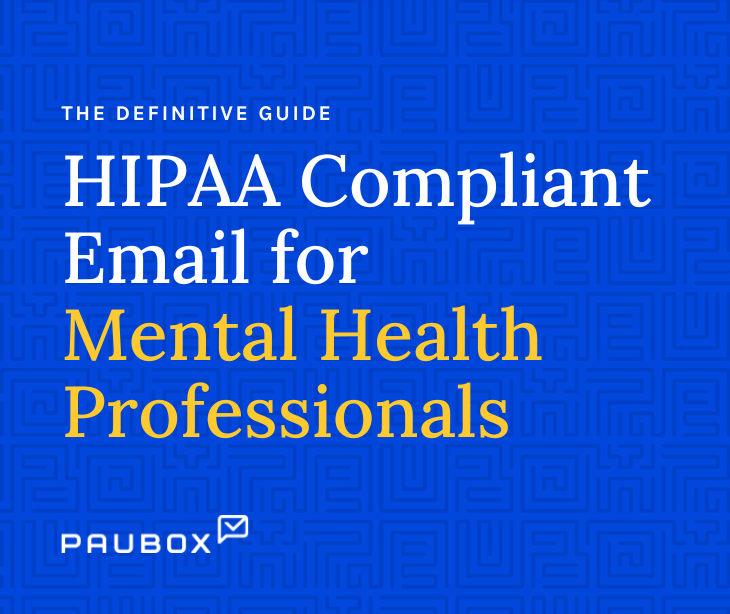
Therapists can use AI in their HIPAA compliant emails to increase communication, streamline administrative work, and free up time to focus on patient care. However, using AI in therapy also raises ethical concerns about confidentiality and the human touch.
Using AI in therapy emails
AI facilitates communication, allowing therapists to handle more cases while retaining the quality of their conversations.
According to an article in Forbes Magazine, “AI is even able to help improve human interactions by analyzing the content of these conversations and presenting insights for next steps or tips for improvement. The result is that customers with complex concerns get better, more personalized attention to resolve their issue and help them feel valued.”
AI tools, like natural language processing (NLP), can help therapists draft, analyze, and categorize emails. It can even assess the client's tone, recognize signs of discomfort, and provide empathetic yet succinct responses.
Enhancing empathy and support
In therapy, empathetic responses help build and sustain trust between the therapist and the client. While therapists themselves offer irreplaceable emotional skills, therapists can use AI tools to recommend responses that convey compassion and understanding.
More specifically, AI-powered sentiment analysis can assist therapists in tailoring their responses. AI’s capability to detect emotional cues in text gives therapists insights they could otherwise miss, particularly in asynchronous communication formats like email. With this support, therapists can offer more sensitive and tailored responses to clients' emotional needs.
Streamlining administrative tasks
Therapists often manage administrative activities like scheduling, follow-up emails, and billing, which can divert attention away from direct care. AI can handle some of these regular duties, like confirming meetings or responding to popular questions, automating tasks and reducing the therapist’s administrative workload.
Ethical considerations and confidentiality
Psychologist Susan Spellman Cann explains that “AI has the potential to impact an individual’s well-being, privacy, and autonomy. As counselors, [we must] address the ethical implications of AI and ensure that its development, implementation, and use align with ethical standards. As counselors and therapists our ethical standards will need to be revised.”
Since therapy emails often include sensitive mental health details, AI systems must maintain the privacy and security of protected health information (PHI). Specifically, therapists must use an AI tool that satisfies the regulations stipulated in the Health Insurance Portability and Accountability Act (HIPAA).
However, balancing personalized email content and patient privacy can be difficult, where the overreliance on AI-generated emails can cause depersonalization. To avoid this, therapists must thoughtfully integrate AI tools to maintain the human touch in their communications.
How to balance AI with human touch
Use a HIPAA compliant solution: Therapists must use HIPAA compliant platforms, including Paubox, to protect PHI from unauthorized access. HIPAA compliant emails encrypt email contents and attachments during transit and at rest, mitigating potential data breaches.
Paubox email allows therapists to personalize emails while maintaining patient privacy. It improves personal healthcare communication and patient satisfaction.
Use AI for routine tasks: Therapists can use AI to handle logistics or generate educational materials, saving time and improving efficiency. They can also use AI to structure their HIPAA compliant emails, but therapists must personalize the message to show empathy and care.
For therapy-related advice, the therapist’s expertise and human touch should always take priority over AI.
Review AI-generated content: Always review and edit AI-generated content before including it in the HIPAA compliant email. Therapists should check that the email contains the appropriate language and aligns with the client’s treatment plan.
Read also: Artificial Intelligence in healthcare
FAQs
Are secure email solutions user-friendly for therapists and patients?
Yes, secure email solutions like Paubox are designed to be user-friendly and integrated into existing email workflows for healthcare providers.
For patients, accessing encrypted emails is as simple as opening a regular email without additional login credentials or portals.
Do HIPAA compliant emails support AI in mental healthcare?
Yes, HIPAA compliant emails allow healthcare providers, researchers, and AI developers to securely share data, supporting the development of more accurate and inclusive AI models while protecting patient privacy.
What happens if a therapist violates HIPAA?
Violating HIPAA confidentiality rules can result in penalties, fines, and disciplinary actions against the mental health professional. HIPAA fines range from $100 to $50,000 per violation, with a maximum annual penalty of $1.5 million. Willful neglect cases can also lead to criminal charges and imprisonment.
Subscribe to Paubox Weekly
Every Friday we'll bring you the most important news from Paubox. Our aim is to make you smarter, faster.




